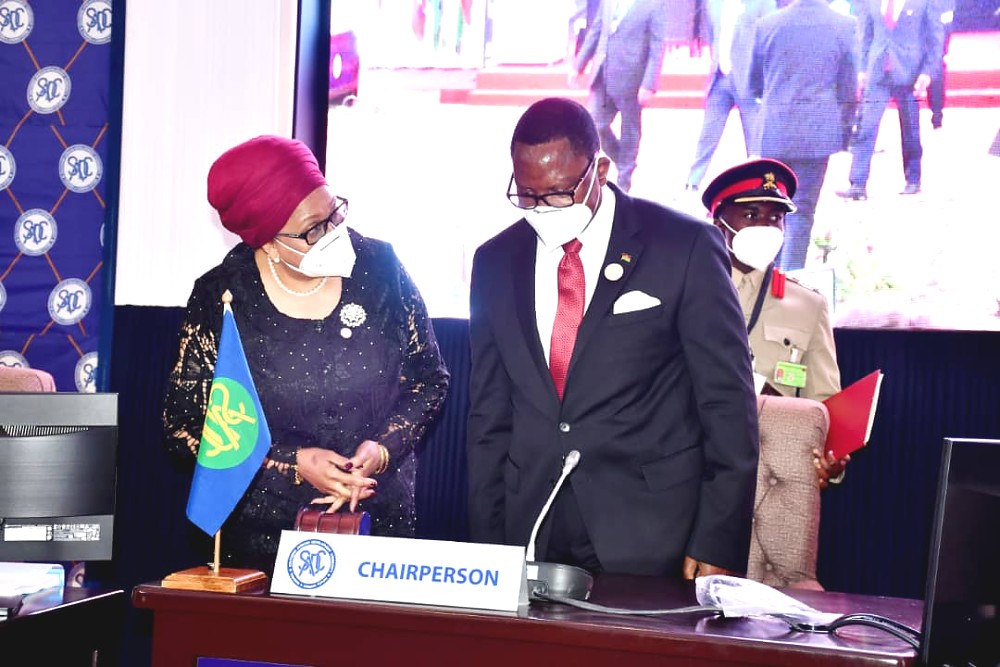The outgoing Southern African Development Community (SADC) Executive Secretary, Dr. Stergomena Tax, has highlighted the achievement recorded during her tenure with the key being increased access to electricity in the region. In her speech at the 41st SADC Ordinary Summit of Heads of State and Government in Lilongwe, Malawi yesterday, Dr. Tax said access to electricity has increased from 36 percent in 2014/2015 to over 50 percent in 2020/2021.
She said the target is to reach at least 85 percent in 2030, in line with the regional indicative Strategic Development Plan 2020/2030. "There has been notable progress in the energy sector, whereby during 2014/2020 the commission power generation in the region increased to 19,738 megawatts, translating to nine percent of the targeted capacity of 22,000 megawatts," she said.
On women empowerment and gender equality in leadership, Dr. Tax said there are several female leaders in various positions in the region, including the first female President in Tanzania, who has shown beyond any doubt that women can steer nations with outstanding, exemplary leadership and wisdom. "Let us support her at all levels. I am calling for sustainable and speed up progress in women's empowerment. I am confident that the region will get more female presidents and many more in leadership positions. There is still ground to be covered, but with the excellent leadership and commitment that the region has, we will achieve it," noted the Tanzanian administrator.
Dr. Tax said there has been significant progress on SADC mobile penetration, whereby member states have established at least two cross border territorial optical fibre links for regional and international transit traffic. According to her, SADC mobile penetration has increased from 60 percent in 2012 to 77,4 percent in 2021, with five Member States exceeding 100 percent mobile penetration.
"The SADC internet user penetration has increased from 4 percent in 2012 to 22,9 percent in 2020. In terms of coverage of mobile service, the average population coverage by mobile networks is 88 percent. These milestones contribute to digitization efforts in the region," she noted. She recalled that her journey as SADC Executive Secretary began on August 18th 2013, expressing gratitude for the confidence and trust given in her to lead the secretariat and SADC region.
"As I exit the region remains stable with some areas of turbulence that we need to continue to manage as we have always done and this includes unemployment, poverty, disasters, pandemic, acts of terrorism, violence and cyber security threats, the region needs to remain alert while strengthening mechanism put in place to address these threats," said Dr. Tax. On the social and economic front, she said the region has made notable strides in terms of microeconomic convergence, industrialisation, SADC intra-trading, regional connectivity, access to energy, financial integration and inclusion and mobile penetration.
She said while the region progresses well in terms of microeconomic convergence over the years, it has been severely hit by COVID-19 and falls in commodity prices. Dr. Tax said the impact of COVID-19 has exerted more pressure on the already weak regional economy, resulting in a significant deterioration in physical position and elevated debt sustainability risks. She encouraged member states to continue with ongoing fiscal and monitoring measures.
The region has also recorded normal progress in financial integration and inclusion. She said the SADC Real Time Gross Settlement System (RTGS) has lowered transaction costs, and it has removed the need for correspondent banks. She said as of June 2021, 83 participating banks from 15 SADC Member States except Comoros were electronically linked to effect cross border payment and settlement in real-time.
From July 2019 to June 2021 total number of transactions settled reached 591,38 billion US Dollars. In the areas of financial inclusion, she said the implementation of SADC Financial Inclusion Strategy and Small-to-Medium Enterprises (SME) Access to Finance 2016-2020 is ongoing and as of December 2020, 68 percent of adults have financially included both formal and informal sectors which are around 97 million individuals in terms of gender split 67 percent female and 7 percent, male.
Meanwhile, President Samia Suluhu Hassan commended Dr. Tax for her time in the office and representing Tanzania well in the SADC top office. "I have assigned her other duties and soon after coming back home, she will start working on her new responsibilities. Let us continue strengthening efforts to develop and empower women in various leadership and economic positions," said President Samia.
